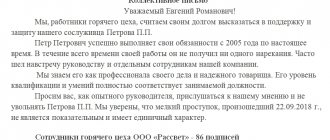The procedure for considering citizens' appeals
All legal documents on the topic (3)
- Constitution of the Russian Federation Article No. 33
- Federal Law No. 59-FZ dated May 2, 2006 “On the procedure for considering appeals from citizens of the Russian Federation.”
- Code of the Russian Federation on Administrative Offenses (Article 5.59)
- — General procedure for considering citizens’ appeals
- — Requirements for a written application
- — The procedure for sending a written request
- — Guarantees for the safety of citizens who sent an appeal
- — Rights of citizens when considering an appeal
- — Responsibilities of the government body, local government body or official considering the appeal
- — Deadlines for consideration of applications
- — Responsibility for violation of the procedure for considering citizens’ appeals
General procedure for considering citizens' appeals
A citizen of the Russian Federation has the right to contact any state and municipal bodies and organizations entrusted with the functions of regulation and/or control of certain areas of life and activity of society, or to their officials. A citizen has the right to apply, including for the protection of his rights, freedoms and legitimate interests. Consideration of citizens' appeals is free of charge. The appeal can be either individual, that is, coming from one person, or collective, that is, coming from a group of people. The appeal can be either “personal”, when a citizen comes to the reception and verbally explains the purpose of his visit, or written, that is, in the form of a document sent either by mail or by courier to the office or secretary. You can also send your appeal in the form of an electronic document. In our opinion, written communication is many times more effective than oral communication.
Requirements for written application
The law imposes certain requirements for written applications from citizens. Thus, it is imperative to indicate where or to whom the appeal is being sent,
namely, indicate the name of the state body or local government body or the last name, first name, patronymic of the relevant official, or at least the position of this person. It is also mandatory
to indicate your data
- full name and postal address to which the response or notification of forwarding should be sent appeal (in the case of an appeal in the form of an electronic document, you can indicate either a postal address if you would like to receive a response by mail, or an email address if an electronic response is sufficient).
The text of the appeal must contain the essence of the proposal,
statement or complaint that the citizen wants to make.
In this case, the handwriting, if the application is written by hand, must be legible. If the text is unreadable (for any reason), the body or person to whom the appeal was sent has the right not to respond and in this case are released from liability. The same fate will befall messages containing insults and/or obscene language, as well as threats against officials and/or members of their families. The text of the appeal must be affixed with a personal signature
(except for an electronic document)
and a date.
If necessary, you can attach documents and materials or copies thereof to support your arguments. If you are sending an electronic document, you can attach scanned copies of documents to it, or send copies separately by mail.
When is it okay not to answer?
In accordance with Art. 11, the deadline for responding to citizens’ appeals to the organization does not matter in the following cases:
- the text contains obscene words, insults, etc.;
- the text is unreadable;
- the essence of the proposal or complaint cannot be determined;
- explanations of the essence of the statement are freely available;
- detailed explanations are impossible without disclosing state secrets;
- the request is not signed, that is, it is anonymous (according to Article 7 of the Federal Law 59, a written application must be signed indicating the last name, first name and patronymic).
Such requests are not considered, which is separately reported to the applicant, if there is information about the applicant and address and it is readable (except for the first case, such a statement can be ignored).
The procedure for sending a written request
A written appeal can be sent by any means and using any means of communication that make it possible to send a document. However, it is desirable to have confirmation that this message was received by the addressee. The most convenient and common are the methods already mentioned above: by mail or by courier to the office or secretary. It is also becoming quite common to apply through the websites of the relevant authorities, where special sections are organized for these purposes. A written appeal is subject to mandatory registration within three days from the date of receipt by a state body, local government body or official. Any appeal officially received by a state body, local government body or official in accordance with their competence is subject to mandatory consideration.
Of course, a written appeal should be sent directly to that state body, local government body or that official whose competence includes resolving the issues raised in the appeal. However, if the appeal does not correspond to the competence of the body or official to whom it was received, such appeal must be forwarded to a state body, local government body or official whose competence is to resolve the issues raised in the appeal. Such an appeal must be redirected within 7 days from the date of its registration. The citizen who sent this appeal must be notified that his appeal has been forwarded. There are also cases when the issues raised in the appeal fall within the competence of several state bodies, local governments or officials, because Often their competencies overlap. In this case, the body or person who received the appeal is obliged to send a copy of the appeal within 7 days from the date of its registration to the relevant state bodies, local government bodies or relevant officials.
WHEN DOES THE DEADLINE START?
Before we begin to consider the issue of deadlines and when they end, it is necessary to determine from what moment, in fact, the period begins to run? As a rule, there are two types of deadlines: “to be fulfilled by a certain date” and “to be fulfilled within a certain number of days from a certain moment.” The day from which the execution period begins to be calculated is either a legally established moment (from the onset of a certain date, from the onset of a certain event) or the fact of notification, receipt of the document by the executor. How to determine this moment?
Beginning of the deadline for execution of a paper document
A generally accepted way of recording the receipt of documents in an organization is to record incoming correspondence. As a rule, this function is assigned to the office, secretary, assistant manager - the position of the person in charge depends on the organization's record keeping system. However, the party that sends the document to our organization for execution is interested in our meeting the deadline, so it will also record exactly when it handed over the document to us. In this regard, remember: in the event of disputes or conflicts, the decisive factor will not be the entry of the receipt of the document in your incoming correspondence book, but the sender’s mark indicating that the addressee has received the document. It could be:
- the date stamped on the second copy of the notice or application;
- a mark on the postal receipt of delivery;
- information recorded by the courier service.
Beginning of the electronic document execution period
In the case of the exchange of documents in electronic form, much depends on the information systems through which correspondence is exchanged (Fig. 1). Most government agencies have already switched to special electronic document management systems (hereinafter referred to as EDMS), which are properly certified and allow one to accurately determine the time of receipt of correspondence. Customs and tax authorities and credit institutions have similar systems. In relations between organizations, if a document is sent using an EDMS, the courts also accept information from these systems as evidence of the timely sending of documents[1].
If the parties do not have a reliable, accepted and agreed upon agreement to exchange electronic documents, documents should be sent in paper form, and if necessary, duplicates should be sent electronically.
If documents were sent by e-mail using a postal service (in cases where this is permissible), the main thing is the ability to record that exactly the required document was sent, and sent at a certain time. If it comes to court, such a service can be provided by a notary who has the right to take actions to secure evidence by examining the email of the interested person[2].
Guarantees for the safety of citizens who sent an appeal
The law provides for certain measures to protect citizens who have sent appeals to a state body, local government body or official. Such protection measures include, first of all, a ban on persecution of a citizen in connection with his appeal to criticize the activities of these bodies or officials, or in order to restore or protect his rights, freedoms and legitimate interests, or the rights, freedoms and legitimate interests of others persons In addition, when considering an appeal, disclosure of information contained in the appeal, as well as information relating to the private life of a citizen, is not allowed, unless the citizen himself has given consent. However, it should be borne in mind that according to the law, redirecting (or sending a copy in case of cross-competence) a written appeal from a citizen to a state body, local government body or official whose competence includes resolving the issues raised in the appeal does not constitute disclosure of information.
What the law says
The deadline for consideration of citizens' appeals to state bodies, local governments, and other organizations is 30 days from the date of registration of the document. It is a violation to send a response outside of its boundaries. There are peculiarities in the consideration of oral and written statements, and nuances in calculations.
There are special rules on the period for consideration of individual requests in Federal Law 59 itself. In Art. 12 states that the highest official of a constituent entity of the Russian Federation is given only 20 days to make a decision on a written report of facts of violation of migration laws.
Many regulatory documents have significantly reduced the periods for providing information and information. Thus, according to the rules for maintaining common property in an apartment building, approved by Decree of the Government of the Russian Federation No. 491 of August 13, 2006, the provider of housing and communal services is obliged to provide the owner of the residential premises with a list of services provided no later than 5 working days from the date of the request.
To oral statements
Art. 13 Federal Law 59 regulates the procedure for personal reception of applicants, but it does not specifically establish a deadline for responding to citizens’ statements made orally. Part 3 states that questions are answered directly during the appointment and do not require additional specialist training. In other cases, a written response is drawn up in the standard manner.
Based on this, we can conclude that the time frame for responding to citizens’ requests orally is as follows:
- to obvious questions - during the reception orally;
- for more complex questions - 30 days in writing.
If a written statement is formulated during a personal visit, it is considered in the standard manner.
For written requests
The procedure for providing a response to a written statement is clearly regulated by law and includes the following steps:
- First, the application is registered, which is given no more than 3 days.
- Then the review is carried out within a month, 30 days, in exceptional cases this period is extended by the head for another month. The contractor must send an interim response to the citizen’s appeal indicating an extension of the review process.
- If during the preparation of the response it is determined that the questions in the request are not within the competence of the organization, it forwards it to the authorized government agency with mandatory notification of the applicant.
It turns out that the 30 days specified in the law in practice amount to 33 days or 46 days (30 days of consideration plus 6 days for registration in both organizations). Taking into account possible forwarding and extension, as well as registration, the answer to the question of what is the maximum period for the execution of citizens’ appeals is 73 days (30 days for consideration, plus 30 taking into account the extension, 7 days for forwarding, plus 6 days for registration). And all these periods do not include postage.
Rights of citizens when considering an appeal
When considering an appeal
state body, local government body or official, a citizen has the right to: - submit additional documents, and also, in case of difficulties in obtaining these documents, apply for their requisition;
— get acquainted with documents and materials related to the consideration of the application. This right, however, has some restrictions. Access to materials may be denied if they affect the rights, freedoms and legitimate interests of other persons, or if these documents and materials contain information constituting state or other secrets protected by federal law; — receive a written response to the essence of the appeal.
To do this, the appeal must indicate the citizen’s full name and address for sending a response.
Otherwise, no response is sent. And that is why, as mentioned above, written appeal is more effective; — file a complaint against a decision made on an appeal or against an action (inaction) in connection with the consideration of an appeal in an administrative and (or) judicial manner in accordance with the legislation of the Russian Federation;
- apply for termination of consideration of the appeal.
Deadlines for consideration of applications
A written appeal received by a state body, local government body or official in accordance with their competence is considered within 30 days from the date of registration of the written appeal.
In exceptional cases, as well as in the case of sending a request, the head of a state body or local government body, an official or an
authorized person has the right to extend the period for consideration of the application by no more than 30 days, notifying the citizen who sent the application about the extension of the period for consideration.
What is the procedure and time frame for considering citizens' appeals?
The procedure for considering appeals from citizens is regulated by Federal Law No. 59-FZ dated May 2, 2006 “On the procedure for considering appeals from citizens of the Russian Federation” (hereinafter referred to as the Federal Law). Applies to applications from Russian citizens, foreigners, and stateless persons. It is mandatory not only for government bodies, local governments, officials, state and municipal institutions, but also for legal entities performing publicly significant functions.
Citizens have the right to apply (personally or collectively) to state bodies, local governments, state and municipal institutions, and other organizations performing publicly significant functions. Moreover, appeal is possible both to the bodies and organizations themselves, and to their officials.
The right to appeal is exercised freely and voluntarily, but must not violate the rights and freedoms of other persons. The review itself is free.
A written appeal must contain the name of the state body or local government body to which the written appeal is sent, or either the surname, first name, patronymic of the relevant official, or the position of the relevant person, as well as the surname, first name, patronymic (the latter - if available) of the applicant, postal address the address to which the response should be sent, notification of forwarding of the request.
The appeal must also state the essence of the proposal, statement or complaint, and include the applicant’s personal signature and date.
If necessary, in support of his arguments, the citizen attaches documents and materials or copies thereof to the written appeal.
Similar rules apply to applications in the form of an electronic document.
A written appeal is sent to the body or official whose competence is to resolve the issue raised (as a rule, this can be found out by studying the materials on the official website of the body).
A written appeal containing issues the solution of which is not within the competence of the state body, local government body or official, is sent within seven days from the date of registration to the relevant body or the relevant official, whose competence includes resolving the issues raised in the appeal, with notification of the citizen who sent the appeal about the redirection of the appeal.
Please note that if the appeal was received in the form of an electronic document, then the response is also sent in the form of an electronic document to the email address specified in the appeal. If the appeal is received in writing, the response is sent to the postal address specified in the appeal.
Applications containing obscene or offensive language, as well as applications whose text is unreadable, will not be considered. If a citizen’s appeal contains a question to which he has been repeatedly given substantive answers, a decision may be made to terminate the correspondence.
If the text of a written appeal does not allow determining the essence of the proposal, statement or complaint, a response to the appeal is not given and it is not subject to forwarding for consideration to a state body, local government body or official in accordance with their competence, about which within seven days from the date of registration of the appeal is communicated to the citizen who sent the appeal.
In accordance with the Federal Law, a written appeal is subject to mandatory registration within three days and is considered within 30 days from the date of registration.
A written appeal containing information about facts of possible violations of the legislation of the Russian Federation in the field of migration is considered within 20 days from the date of registration of the written appeal.
In exceptional cases, the head of a state body or local government body, an official or an authorized person has the right to extend the period for consideration of an appeal by no more than 30 days, notifying the citizen who sent the appeal about the extension of the period for consideration.











